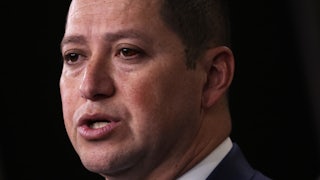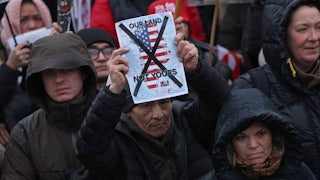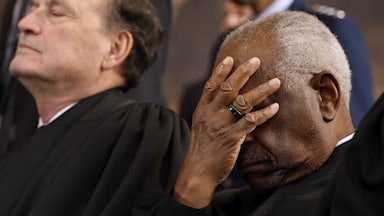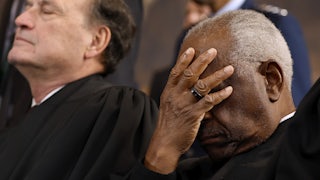If any political commentators or Democratic politicians are tempted to see the political battle over President Trump’s bombing of Iran through the prism of the run-up to the Iraq War two decades ago, here’s a tip: Don’t.
For politicians and pundits of a certain age, it’s normally assumed that military action will unleash a “rally around the flag” effect, leading the public to reflexively approve of the decisions by the “commander in chief”—particularly if he’s a Republican—and automatically see criticism of him as unpatriotic. But it’s unlikely that we’ll see a similar dynamic this time around.
A surprising new CNN poll shows why. It finds that 56 percent of Americans disapprove of Trump’s bombing of Iran, while only 44 percent approve. Strikingly, 60 percent of independents disapprove, suggesting the middle of the country is not with Trump on any of this.
On Tuesday, while leaving for the NATO Summit, Trump erupted at Israel and Iran for violating a ceasefire he’d announced on Truth Social, fuming that they “don’t know what the fuck they’re doing.” Iran launched a strike after the ceasefire. But Israel’s response appeared deliberately limited, suggesting both countries want a lasting truce, which Trump highlighted to claim victory.
Trump’s anger—combined with the new CNN poll—illustrates a complicated tension about this moment. On the one hand, if the truce holds, it’s very possible that the CNN polling (which was conducted before the ceasefire) could flip and the public may end up approving of his handling of the situation.
Yet the poll also constitutes a clear warning to Trump. Majorities have zero appetite for any kind of drawn-out conflict, and it’s likely that this partly is rooted in perceptions that on complicated national security matters, well, Trump has no bleeping idea what the bleep he’s doing.
Note the CNN poll’s remarkable finding that 55 percent of Americans don’t trust Trump to make the right decisions on the use of force in Iran. This includes 62 percent of independents. That’s a stunning verdict on public perceptions of Trump’s competence, or lack thereof. (Meanwhile a Reuters poll finds only 36 percent back the bombing.)
It’s no accident that the CNN poll also finds that 58 percent of Americans say Trump’s bombing will make Iran more of a threat to the U.S. Those two things may be connected: Voters appear unwilling to reflexively grant deference to the commander in chief’s declaration that military force is essential to preserving the security of the homeland. Especially if that commander in chief is Donald J. Trump.
This will surprise those who were snakebit by George W. Bush’s popularity in the run-up to the Iraq War and Karl Rove’s political warfare at the time. The grounds for that war were visibly thin. Yet it’s hard to convey to people who didn’t live through it how unshakable Bush’s grip on public opinion seemed after September 11, 2001; how rampant war fever and rank Islamophobia were in this country; and how deeply it all penetrated into every crevice of American life.
It’s not hard to see why things are different now. Obviously, we’ve lived through two “forever wars” since then, and this time, there was no September 11 to rally the public. But there are other reasons too. Bush was more popular (due to September 11) than Trump is now. And public skepticism of Trump’s fitness to make decisions like these—again, 55 percent seem skeptical, per the CNN poll—runs so deep that he is ascribed little credibility on these matters, leaving no room to maneuver on them.
That latter dynamic probably won’t change much even if the truce holds. Consider the run-up to the bombing: Trump’s own intelligence officials said Iran’s nuclear program didn’t pose an imminent threat, which he impulsively dismissed. His warmongering tweets in real time likely alerted Iran in ways that allowed it to move and secure its enriched uranium. As national security analyst Jeffrey Lewis usefully details, the stated American objective of ending Iran’s nuclear program has probably not been achieved.
If the ceasefire remains, paint-by-numbers pundits will forget all that and robotically declare the entire saga a smashing political triumph for Trump. But there’s no need to assume up front that the public will view things this simplistically. Something big is at stake here: Trump and propagandists like Vice President JD Vance want to use this moment to show that a new Trump doctrine has taken hold, and that it will be persuasive to the public. The idea, as Politico’s Nahal Toosi shows, is basically that it doesn’t count as “war” if the objective is narrowly drawn and accomplished with quick, overwhelming force and no lengthy quagmires.
But the case that diplomacy as opposed to force could have achieved a more lasting solution to the deeper Iran-Israel problem, which Stephen Wertheim explained well before the bombing, remains just as true now as a week ago. So does the case that we would have been better off under the 2015 Iran nuclear deal, which Trump sabotaged. My suspicion is that the public will conclude something similar: That 58 percent say the bombing will make Iran more of a threat hints at a preference for diplomacy to war that will endure.
The stakes are also huge here because Trump and Vance surely hope their showcasing of the Trump doctrine will also seduce voters into accepting quick military actions without congressional authorization. But the new CNN poll finds that a whopping 65 percent say Trump should seek such authorization going forward. And I’m even more persuaded that this will hold even if the ceasefire remains.
Here’s the bottom line: As of now, majorities don’t trust Trump to make complicated national security decisions in the best interests of the country and want Congress deeply involved in them. We should hope the truce holds. But either way, the absence of a reflexive public endorsement of Trump’s warmaking is a positive development—and a sign, whether he knows it or not, that he remains on a very short political leash indeed.






